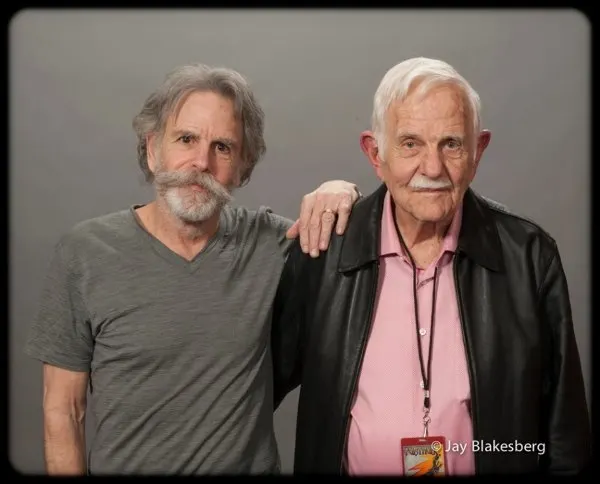

Once in Awhile You Get Shown the Light in the Strangest of Places if You Look at it Right
Assumptions are like assholes: Everybody has them and they are usually full of shit. We all know that whenever you “assume” anything, you just end up making an “ass” out of “u” and “me”, but somehow we are all susceptible to our preconceived notions, a tendency which has the unintended consequence of leaving us eschewing pivotal life paths based upon the whims of bias over substance. Often we have no freakin’ clue why we spurn certain options in favor of others, but we maintain an unjustified measure of conviction nonetheless. But it is only through letting go of these presumptions that we can be open to all the precious miracles of happenstance that life sometimes affords us.
Take for example the case of Bob Weir. For those who are unaware, Weir is a singer and guitarist best known for his work with the Grateful Dead. Given up for adoption at birth by a student at the University of Arizona, Weir was raised by a San Fransisco couple and only learned of his true birth mother years after he had run away to form the Grateful Dead and his adoptive parents had passed away. His biological mother, Phyllis, contacted Weir decades later, but the two didn’t really hit it off. Still, she told him the identity of his biological father, an Air Force colonel named Jack Parber who never knew of Phyllis’s pregnancy. Now given the Grateful Dead’s penchant for welcoming all sorts of freaks and hippies into the wandering caravan of music and counter-culture zealotry, Bob Weir would be the last person you would generally think of as being prejudiced or judgmental. The Dead have always invited all to join them under their circus tent of revelry. But Weir, who has always considered himself “pathologically anti-authoritarian,” didn’t think he’d jive with the vibe of a father who had made his living in the military. Even though he knew his father was running Hamilton Air Force Base in nearby Marin County, Weir sat on the information for over a decade. Weir assumed that he and Parber just wouldn’t get along.
But finally in 1996, after 40+ years and much urging from his wife, Weir picked up the phone and called the father he had never known.
“I’m Robert Weir and I live in Mill Valley and I¹ve been doing some research and have dug up some information that may be of considerable interest to you. Is it possible that you were romantically involved with a woman by the name of Phyllis?”
“Well, yes,” Parber responded.
“Sir, in that case there’s a very strong likelihood that, even though I”m not sure how many children you have, but you may have one more than you know.”
This was followed by a long silence and then Parber said, “The only Robert Weir I know is the guy that sings and plays with the Grateful Dead.”
“Well sir, that would be me.”

Parber and his wife, who had four sons of their own, immediately took to Weir and his wife and became “wonderful, doting” grandparents to the Weirs’ two small daughters. Despite his initial reticence, Weir made weekly visits to see his father and formed a fundamental relationship that would endure until Parber passed in 2015. In fact, despite the military background that kept Weir at bay for years, he ended up finding much of himself in the retried Air Force colonel. Writing in a very personal essay shortly after his dad’s passing, Weir wrote, “We both share a singular inability to take anything seriously or an ability to make light of pretty nearly any situation. The more time we spend together the more similarities I see and realize that the apple does not fall far from the tree. And even though I didn¹t grow up with him, in many ways I am as much, if not more like him then is own sons.”
Turns out that all four of Parber’s other sons were also guitarists, one of whom, Anthony, was a devout Deadhead who had seen the band a number of times never knowing that the man he idolized on stage was actually his half-brother. The oldest Parber brother, James, pursued a career as a musician for a number of years, playing with a local country-rock outfit, Lawrence Hammond and the Whiplash Band, before spinal cancer made it too painful to play. He spent the next 12 years under the care of his parents, dying a slow, agonizing death that finally came in 1991.
Though Weir never met James Parber, he would discover the latter’s beat-up vintage 1956 Fender Telecaster in a spare bedroom at his father’s home. Asking if he could take the guitar and refurbish it, Weir introduced it to his bandmates in the Dead. It has been his staple on-stage guitar ever-since, an homage to the family he almost never knew.
I once had an old, salty Australian river guide tell me that the reason crocodiles are such amazing creatures are that they never miss an opportunity. “You and I,” he said with a crooked smile that landed somewhere between bush country rambling and profound Shamanistic insight, “We miss opportunities all the time. The job you didn’t take. The girl you didn’t ask out. But once you are in their circle of opportunity, a crocodile never misses.”
Ok, I know our gap-toothed sage was waxing philosophical on a large reptilian carnivore ripping apart your flesh, but I really do think he was onto something. Too often we close doors that should be left open, all for our assumptions of what we think lies behind them. But Monty Hall would be the first to remind us that Door #2 might just lead us to unexpected consequences. So open yourself to the opportunities life presents to you. You might just find out that your brother plays for the Grateful Dead.
Steven Craig is the author of the best-selling novel WAITING FOR TODAY, as well as numerous published poems, short stories, and dramatic works. Read his blog TRUTH: In 1000 Words or Less every THURSDAY at www.waitingfortoday.com






